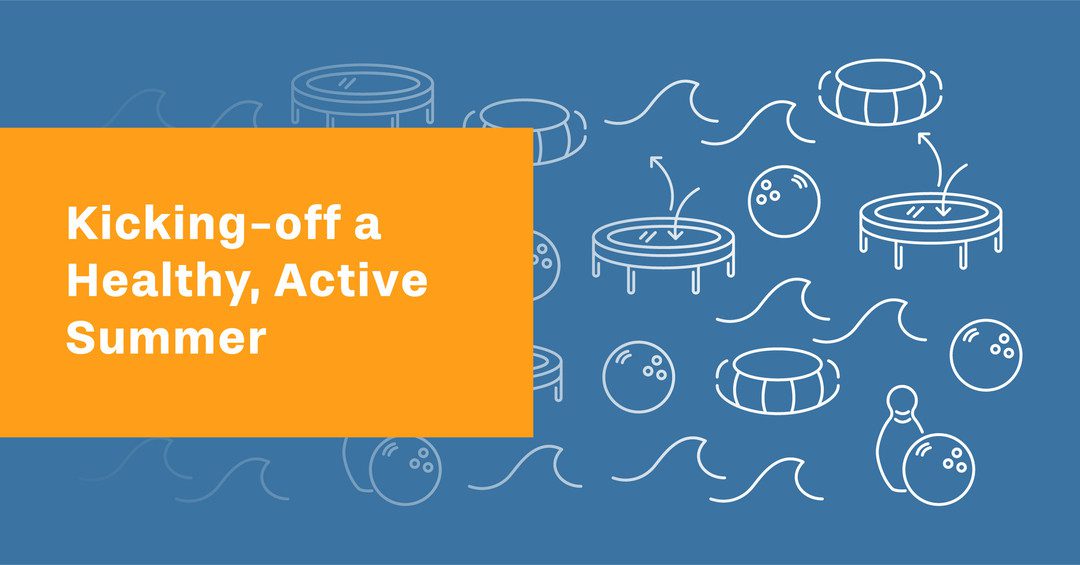
Health and Fitness for All!

Jun 01, 2018
It's National Health and Fitness Day 🏋️
We all know that prioritizing and maintaining personal health is important; living a healthy lifestyle provides a myriad of psychological and physical benefits. This is true for everyone regardless of age or ability.
For those with a developmental disability, there are some added factors that make health and wellness even more essential. Obesity and diabetes are common conditions that many individuals live with, often stemming from side effects of medications, less-than-ideal dietary habits, and challenges with motivation. Prioritizing health and fitness can easily be sidelined by existing lifestyle constraints – for this reason, it is even more important to do what we can to ensure our loved ones are living their best lifestyle.
To kick-off a summer of health and fitness, we have compiled a few strategies to help your loved one form healthier habits!
Benefits of a Healthy Lifestyle
It truly is worth it to start making small, incremental adjustments to your loved one’s routine. For those with developmental disabilities, the introduction and ongoing practice of healthy living habits makes a world of difference. Here are some of the benefits:
- A richer, more fulfilling life. For fitness in particular, activities push you out into the community. Your loved one will get to experience new things, meet new people, and will have more opportunities for inclusion.
- Better physiology. Digestion is improved with a balanced, healthy diet. Dietary considerations are especially important as gastrointestinal issues as quite common.
- Behaviour management. The unsavoury behaviours that we try to manage are often triggered with physical discomfort. A focus on physical health will in turn help reduce these behaviours; happy inside, happy outside.
- Emotional boost. Mental health improves because much of the activities and exercise happens outside of the home so there is a major social aspect to health and wellness!
Common Challenges
Making a change to exercise more, be more active, or more diet conscious is hard for everyone. Our loved ones face a different set of challenges in making the shift over to a healthier lifestyle, these can include:
- Low to non-existent motivation
- Challenges with fine and/or gross motor skills
- Physical limitations
- Special sensory needs
The best thing you can do to support and encourage your loved one’s healthy choices, is to always be understanding and patient, while accommodating to their needs.
Strategies for Introducing a Healthy Lifestyle
Every individual is different and there are a number of effective strategies that can be used to help your loved one get moving and eating right!
Exercise:
Your loved one may not be motivated by social ideals like “Body Image” and some exercises may not be suitable for them (for example, going to a gym may be too overwhelming). Fitness routines must be customized for the individual!
- Find their motivator. For those with developmental disabilities, fitness and health can be a grey-area concept. It’s difficult to connect the dots from action to benefit, so aligning new healthier habits with their motivators is a great place to start. For example, if Ben needs to eat bread every day, start planning for him to walk through every aisle in the grocery store instead of going straight to the bakery. Get creative!
- Use stories and visual cues. Your loved one will benefit from simple stories and visual cues that illustrate certain activities or foods that you are trying to introduce into their routine. This will help to ease them in to changes.
- Fitness in all forms. Take every opportunity to work physical activity into your loved one’s routine – these successes can be small and that’s ok. Opting for the farthest parking space may substantially increase your loved ones step count!
- Positive reinforcement. It’s always a great idea to reinforce healthy behaviours with special treats. This can be one of their favourite foods or extended time playing their Xbox.
- Tailor activities to interests. We want to spend time doing what we enjoy. Same goes for our loved ones. Think about what they are interested in and make the effort to find activities where they can thrive. For example, if Sue is a big fan of planes, perhaps a day trip to the Alberta Aviation Museum would be a great activity!
Diet:
- Portion control. An important method to manage and avoid obesity is controlling how much your loved one eats. Typically, what they see is what they eat – so portioning and meal/ snack planning become very important. For example, try putting a couple Oreos in a small Ziplock bag so that they eat 2 instead of 20.
- Find easy alternatives. Cravings can throw a diet out of balance. Treats and snack foods can become a comforting part of daily routine, which is absolutely fine when managed. If your loved one is a big soda drinker, try out a SodaStream – this way they will still get the comforting sensory fizz of the soda but with sugar-free flavourings. You could even eventually start phasing out some of the pop intake with water.
- Create a social story. Stories are one of our team’s most used strategies. These help our clients understand and process concepts that are not black and white. So for instance, if your loved one always overeats, then has physical discomfort, they may respond by engaging in challenging behaviours; a simple social story like: “if you eat too much your will get sick, then you can’t play your video game” can be useful at helping them understand the reason behind healthier choices.
Perhaps most importantly, as a care giver it is important to understand that positive emotions are often tied to food. Those with developmental disabilities are living a different reality from us and may not be finding gratification or fulfillment elsewhere (jobs, socially, in relationships, travel, etc.); so restrictions to food can be tough because food can potentially be a main source of meaning in their life.
A few important take-aways:
- Every day coaching and consistent support is required.
- Take baby steps – for example, moving from soda to flavoured water.
- What we consider exercise or dietary success will not be the same for our loved ones. It is important not to place our standards upon them.
- Celebrate even the smallest of wins.
- Keep working at it. Habits are formed over time; as a caregiver, you are the source for daily motivation and support.
In the spirit of June's Health and Fitness focus, we will be sharing some other tips and recommendations for getting out and enjoying the summer. Stay tuned for some great local Edmonton activities that our clients have loved to be a part of over the years!
